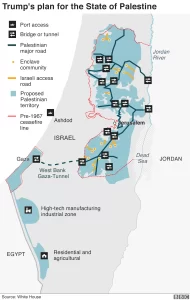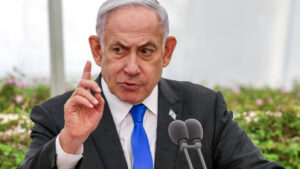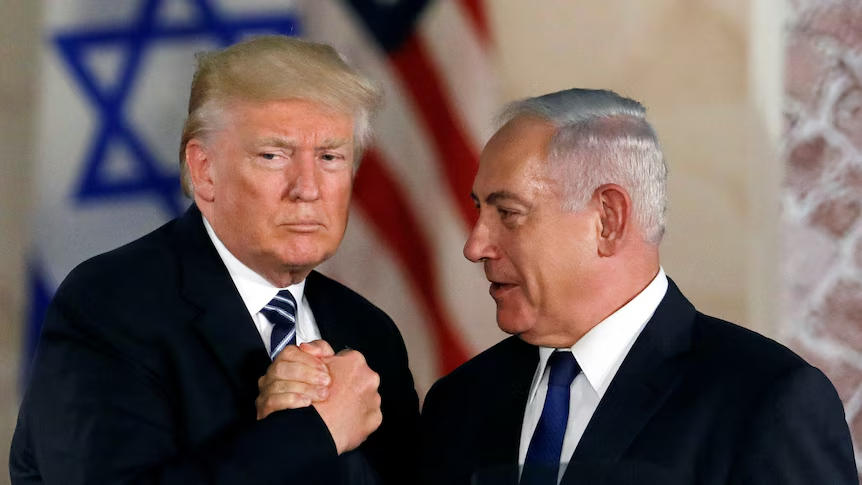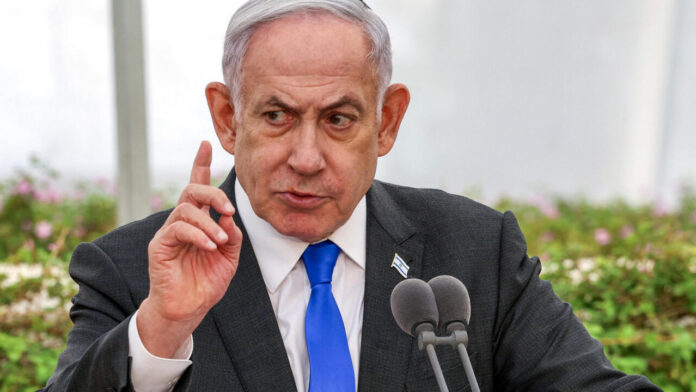It seems now like the 15 month war in the Middle East is coming to a close. A hostage deal between Israel and Hamas has been signed. The first 15 hostages have been released alive. Under immense pressure from the Trump Administration, Hamas has folded on some minor points, while “tense” meetings between Israeli Prime Minister Benjamin Netanyahu and Trump’s team have resulted in Israel softening its position on a ceasefire. But what would this deal mean for the parties involved, and will the region finally be at peace?
The Art of the Deal
The terms of the ceasefire agreement are, broadly, as follows: Hamas will initially release around 33 hostages, some alive, some dead. In exchange, the IDF will withdraw from the urban areas of Gaza, to the sandy outskirts of the Strip. Starting with the children, the sick, the elderly, and the women, Hamas will release them slowly over 42 days. They could be alive or dead, because Hamas refuses to provide lists of who’s living or not. In exchange, over 1,000 Palestinian terrorists will walk free from jails in Israel. On the 16th day of the ceasefire, negotiations regarding phases 2 & 3 will begin. Phase 2 will see the remaining living hostages released in exchange for a complete Israeli withdrawal and more terrorists released. Phase 3 sees Hamas return the bodies of the dead in exchange for yet more prisoners.
There is no extension of the ceasefire if the 42-day phase 1 expires before negotiators come to a deal, which means this war is not necessarily over. Perhaps Trump will not permit it, but it’s possible Israel intends to get the 33 back, and resume the war with only the strongest hostages still in captivity (i.e. captured male IDF soldiers). It’s also possible Israel will follow the entire plan, and then destroy Hamas as soon as they no longer have leverage.

Once the Dust Settles
The “day-after” plan for Gaza, as presented by Secretary of State Antony Blinken during the closing days of the Biden Administration, is to bring in the Palestinian Authority (the contemptable group of pseudo-terrorists in charge of the West Bank) for administrative roles, reform it into an entity that actually functions, and have a coalition of Arab countries take care of the security on the ground. This is a stupid plan because the words “reformed” and “Palestinian Authority” are, when put together, a paradox.

That organization is so hollow, so overrun with corrupt bureaucrats, terrorists, and terrorist sympathizers, that it is unsalvageable. They can’t even keep a lid on their part of the West Bank, so how would they ever control Gaza’s jihadi problem? The IDF just had to launch Operation Iron Wall because the PA lost control of an entire major city to terrorists. As for the Arab countries forming a peacekeeping force, I question their willingness to slug it out with Hamas insurgents in a post-war Gaza. I just don’t foresee Arab governments chomping at the bit to have troops dying in a fight to police other Arabs, just so they can protect the Jews.
It’s not assumed that Trump’s team will implement that plan. All we know is that Biden officials handed off the details to Trump to do with as he pleases. To be noted is that Trump was previously much less sympathetic to the Palestinians than Biden. Israel was days away from annexing Area C of the West Bank under his watch in 2020, after all.
It’s a solid bet to say the new administration will ignore the plan, if for no other reason than that Biden officials put it together. Trump also recently posted to his Truth Social account a statement proclaiming the U.S. will “make sure Gaza never again becomes a terrorist safe haven”. How he guarantees that, I don’t know. But at least it’s nice to have the assurance that was sorely lacking in the last administration.

The Implications for Hamas
For Hamas, this could be either a victory or a defeat depending on the scope of the lens: The deal itself is everything they wanted. The war as a whole has been a disaster.
From the narrowest of lenses, this deal is pretty sweet for the terrorists. If we focus only on the deal itself, not only does the IDF withdraw, but also they release over a thousand convicted murderers, rapists, and other terrorists from prison. Hamas can resume arms smuggling across the Philadelphi Corridor, and begin rebuilding their network of terror. Hamas lives to fight another day, and they have freed their brothers-in-terror. It’s the Gilad Shalit deal all over again.
But in a broader sense, this war has been absolutely devastating for Hamas. Virtually their entire pre-war leadership is dead. They started off with roughly 40,000 troops. They now have around half that, and most of the remaining fighters are new recruits from after the war’s start, many being literal children with zero training or experience. Another factor is that the majority of these terrorists are now disorganized, small squads running around the ruins of Gaza, with no command structure to coordinate their actions. It will take a long time to come back from that sort of command-and-control breakdown. Hamas will not be a threat for several years. After that, though, is another matter.

The Implications for Israel
As far as Israel is concerned, this deal, to be blunt, is hot garbage. It gives concessions to Hamas nobody should ever have to consider. From a wider perspective of the war, the picture is more cloudy. But let’s look at this from both a narrow and a wide lens.
As far as the deal itself is concerned, this a an awful plan, with a level of shortsightedness rivaling that of a cane-less blind man. Make no mistake, innocent Jews will die because of this. The imprisoned terrorists killed once, and they will kill again. The ramifications will be catastrophic if Hamas takes back Gaza. America can feel all snug and secure withdrawing from Afghanistan, 7,000 miles away. But how would you like the Taliban living less than 2 miles from your house after your entire family was murdered and your sons sent off to war?
At a 50,000-foot view, the war has had more mixed results. Hamas has been thoroughly beaten to a pulp, even if their recruiting efforts have netted them the Palestinian equivalent of 16-year-old Volksjaegers in WW2. Their infrastructure, their tunnels, their rocket launchers, are all devastated. They also failed to achieve their goal of permanently killing the Arab-Israeli Peace Process. Saudi Arabia is still open to talks on the same terms as before. But Hamas did succeed in killing Israel’s image. The Europeans despise Israel now, and as Synagogues get firebombed as an “expression of solidarity with Palestinians”, they do nothing to stop it. Overall, this war was, for Israel, a victory militarily, inconclusive diplomatically, and a disaster for public relations.

My Take
Frankly, the deal’s bad. Excruciatingly bad. Thousands of terrorists for less than 100 innocents, only roughly half of whom are alive. Israel has been finding new ways to invert The Art of the Deal for decades now, and this is the culmination of that: the ultimate, final result of 30 years’ worth of awful negotiation. However, after some reflection on the past 15 months, I’ve concluded that this deal had to be made, for whatever that’s worth.
The Reasons
The first reason for stopping the war is pretty obvious: all those people that are dying. For the civilian Palestinians caught up in all this, its been an unpleasant 15 months, to say the least. Tens of thousands dead, homes bombed out, and food shortages. These are the things seen in a warzone, and the civilians of Gaza have borne witness to all of it. It goes without saying that this sort of thing ought to be minimized. There is not a doubt in my mind that within 7 years they will see another war because of this deal. But for now, the people of Gaza will have a rest.
Secondly, for as long as Israel’s war goals included the destruction of Hamas and the rescuing of the hostages, they were mutually contradictory. The reason Israel hasn’t destroyed the terrorists in much of Gaza is that those areas were roughly where intelligence suggested the hostages were. They couldn’t go in guns blazing because Hamas would execute the captives, and rescue missions are only viable if the hostages are above ground. The IDF is good, but until they find a way to magically vaporize every terrorist in a tunnel, the below-ground hostages are doomed to an eternity of subterranean hell.

It may also be time for Israel to focus on other priorities. For one, it’s a good idea for Bibi to placate Trump. If Netanyahu keeps Trump happy, both gain things in return. Trump gets headlines about being a peacemaker, and Bibi gains concessions in the West Bank, or on the Iranian issue. If Iran makes that one last mad dash for a nuclear weapon, it’s likely Trump will greenlight IDF airstrikes to put a stop to it. That was far from a given under the prior administration, and it may not have been a given had Bibi annoyed Trump with refusal to cooperate.

Additionally, the Israeli economy is hurting. It has remained remarkably resilient due to a tech sector that’s surviving and a defense industry that’s thriving. This is all despite a severe manpower shortage in the workforce due to reservist mobilization. But the Israeli GDP likely would have grown at a respectable pace as the pandemic slipped further into the past. Instead, it only grew by a small amount in 2024, beating predictions but also showing the missed potential. If the reservists go home and work again, it will benefit Israel greatly.
On the diplomatic front, Israel needs this war to end if they are to make peace with Saudi Arabia. If Israel and the Saudis can finally built that ever-elusive Abrahamic Alliance against Iran, the entire world will have cause to rejoice. With Trump in office, and the war at an end, Israel can score arguably the greatest diplomatic victory in middle-eastern history: peace between the Jewish State and the capital of the Muslim World.
And, of course, the question remains: how does this affect the United States? We live in Dallas, not Tel Aviv, so how does this benefit our own country? First, the ceasefire improves our relations with the Arabs. This war has put strain on relations between the U.S. and various Arab governments. We need them for regional stability, and we need the Israelis for cultural and economic reasons. So we now have to walk a tightrope between appeasing the Arabs and supporting the Israelis. That gets significantly easier when the Gaza Strip isn’t an active warzone. The second, and perhaps more obvious benefit is that we don’t have to help bankroll the IDF’s operations because they won’t be happening. 2,000 pound bombs are a precious commodity, and at this rate, we might need them sooner than we’d like.

To conclude, sometimes a nation has to rip the bandaid off. Sometimes a nation has to admit when the costs of carrying on are too high. When the deaths of its soldiers are increasingly for nothing, and when the opportunities afforded to it by cutting its losses are great enough to justify stopping. I think that, at this point, Israel can justify stopping the war on the grounds that they have bigger fish to fry in terms of diplomatic, economic, and security concerns.
In summary, the deal had to be made. To quote Ecclesiastes, there is a time to love and a time to hate, a time for war and a time for peace.
Stay tuned to The Roundup for upcoming coverage on the Inauguration, new cabinet appointments, and more!






